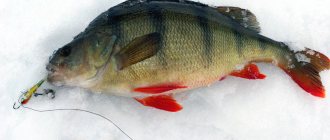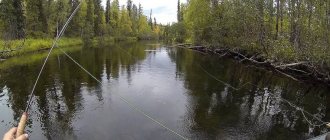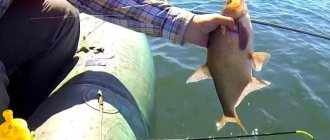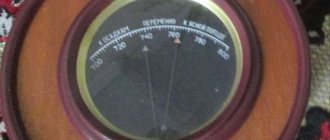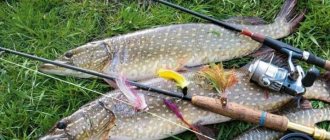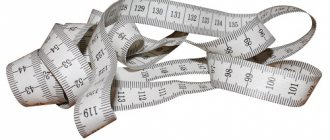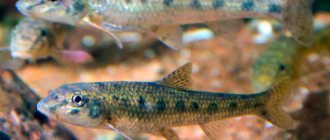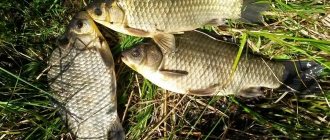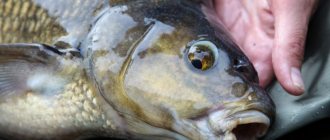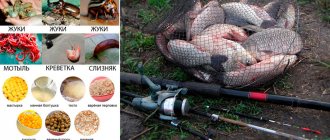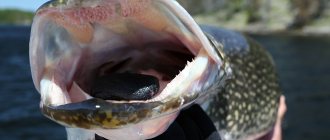The eternal question of the fisherman is: at what pressure does the fish bite better in winter? Thousands of fishermen are struggling with the decision; the fishing environment is filled with fiction and guesswork. And everyone has developed their own understanding of the influence of this factor on winter fishing. The Internet is full of articles about supposedly “better” or “bad” blood pressure. But this information, to put it mildly, is unscientific, and does not relate to the winter bite, but to the personal opinion of the authors of such publications. One thing is for sure - atmospheric pressure affects the life activity of underwater inhabitants in winter. We will discuss how exactly further in this article.
The generally accepted opinion about the effect on biting
The fishing community believes that there is normal pressure for fishing in winter and abnormal pressure. Peaceful fish are better caught at high and high pressure, and predators at low and low pressure. Long jumps discourage the bite. Anglers often put the factor of pressure on fish biting first among others. The pressure for fishing turns into a deity that you almost need to pray to so that it is “correct” when going to a winter pond. On forums there are battles and disputes about at what atmospheric pressure the fish bite better.
Tip #2: Choose the right time
The most abundant catch will be in the first 2-3 weeks after freeze-up. During this time, the fish are still off the coast and actively moving around the reservoir. Towards the middle of winter, and especially during severe frosts, it goes deeper. Perch, for example, looks for holes on the bottom that are surrounded by smooth areas. It is here, in the flat areas, that the roach, tasty for a predator, will hide. Therefore, for winter fishing you need a fishing rod of at least 20-40 cm with a sensitive and hard rod. This type of tackle is also suitable for bream. He also loves depth. But the roach always stays at 2-3 m and does not like to migrate.
Next good period for fishing:
- end of winter - before the thaw,
- periods of winter warming,
- clear weather without precipitation,
- partly cloudy weather with slight wind loads.
It bites better in the early morning and at sunset. But during the period of snowfalls, strong winds and frosts, the bite actually stops.
Angler Misconceptions - Busting Myths and Speculations
The influence of atmospheric pressure on fish biting matters, but not nearly as much as we imagine. After studying the issue, you come to the conclusion that we, fishermen (and not ichthyologists), are mistaken when trying to determine the optimal pressure for fishing in winter. This is such a multifaceted moment of influence on the bite that it is impossible to say anything unequivocally about this.
This factor must be considered in conjunction with other phenomena, among which there are much more important ones than the barometer readings. One thing can be said for sure about how pressure affects fish - this factor does not determine the intensity of the bite, but indirectly affects it.
The developed tables of the influence of pressure on fish biting in winter do not reflect reality. Such a truly relevant table can theoretically be created - separately for each pond, lake, small section of a large reservoir, etc. Moreover, after many years of research and observation. And such a schedule will not last long - until, for example, the wind rose or the hydraulic engineering of the reservoir changes.
Do you understand the volume of such work on the scale of all water bodies? Therefore, it is impossible to create a single valid biting plan. And what is there reflects, at best, general weather trends and the personal opinion of the compiler.
How to increase fish bite in winter?
Every real fisherman, coming to stores, especially grocery stores, thinks about how to use certain products while fishing and whether they can improve the fish bite.
When fishing, every little thing can be used, and sometimes significantly improve the fish bite. Many fishermen fundamentally do not use store-bought baits because they do not know what they consist of. Of course, they will attract fish, but sometimes little things collect at the feeder. But, as one famous fisherman said, “A fish should look like a fish.” Accordingly, the bait should contain natural and fresh ingredients, and not expired ones. And it’s more interesting to do it yourself - what an experiment. And the cost of homemade baits is somewhat cheaper.
Let's look at a few examples of a fish bite activator:
Flavoring sprays In winter, some fishermen actively fish with maggots, baiting them with all kinds of reelless jigs. This is done to improve the fish bite. But I would like to note that recently store-bought maggots have stopped emitting all sorts of odors. You may have noticed that previously fish simply attacked the maggot in schools, but today it can stand untouched. And all this is not because there are few fish or that they are spoiled - no. If you sprinkle the maggots with air flavoring before lowering them into the hole, the bite will increase significantly. Try it and surprise yourself.
Bread made from rye flour
You've probably seen puffed bread in the bakery departments of stores. Today, stores offer a huge selection of bread, both simple - rye, and with various flavors - strawberry, apricot, herbs, etc. Fishermen have long noticed them and take them with them on fishing trips to lure fish to the hole. Breadcrumbs are an excellent substitute for breadcrumbs. You just need to crush them into fine crumbs and pour them into the hole. The bread crumbs turn out to be very light and will not sink immediately, but after a few minutes they will absorb moisture and slowly sink to the bottom. Breeder and roach actively flock to such bait. And some fishermen use flavored bread as bait for carp or carp, making peculiar rolls from the bread crumbs.
Smoked capelin
It would seem, how can capelin be useful for fishing, and even smoked? Yes, I, like many fishermen, have previously heard that pike perch is excellently caught using frozen sprat, but I have never seen such information anywhere that fish are caught using smoked capelin. It turns out that Russian fishermen found a use for it too. I learned about this not so long ago when I was fishing on a river in the middle of nowhere. The bite was, to put it mildly, not very good. But my neighbor quite often had large bream and roach passing by. Approaching it, I felt a persistent, appetizing smell of smoked fish. As it turned out, he was catching fish with capelin, and he did it like this: after chewing it a little, he put it on the hook and sent it into the hole. Thus, in one hour he caught two dozen small roach and bream.
As one philosopher said: Live forever and learn...!
Share on social networks:
Specific barometer values
Another myth is the claim that some specific atmospheric pressure is considered normal for fishing, while others are not. The altitude varies across regions. And it is impossible to say that the norm of 760 mm of mercury is good for fishing. In Western Siberia this will have a different meaning, and on the Eastern plateaus it will have a third meaning. This value is relative; it is impossible to use specific values to determine whether the bite will be good or not.
There is no specific value or norm of atmospheric pressure for a good fish bite. To predict fishing, you need to take into account not a specific value, but trends of change: it grows, falls, jumps or stays at the same level - this can really help the fisherman.
Effect on the swim bladder and the ability of fish to control buoyancy
Often in disputes about what atmospheric pressure is best for fishing, people cite the example that pressure greatly affects the swim bladder, and this is associated with a deterioration in biting during pressure surges. The truth is that even with a change of, for example, 10 mm of mercury, the fish, in order to equalize the pressure in the bladder, needs to change the depth of immersion by only 10 centimeters. Meanwhile, underwater inhabitants constantly change their diving depth, walking many meters in the vertical plane, and do not experience any problems.
Fish swim bladders are a perfect organ for regulating buoyancy, and the influence of pressure changes on them is minimal. Therefore, the statement that pressure affects fish biting in winter due to its effect on the swim bladder is nothing more than speculation. These are attempts by fishermen to explain to themselves the influence of this factor on the bite. In fact, normal pressure for fishing in winter is almost any (except for long periods of constant sharp surges). It’s just that in winter conditions the fish behave differently, and the angler needs to choose the right fishing tactics, bait and gear.
The main factor in winter is oxygen in the water, temperature and food availability.
Pisces are cold-blooded creatures. Metabolism directly depends on temperature. The higher the temperature, the more active the cold-blooded ones are, and vice versa. These organisms live in water and extract oxygen from it with their gills. Depending on the temperature, water is saturated with oxygen to varying degrees. At low temperatures, more oxygen is “placed” into the water, and at high temperatures, less. Here we get the opposite paradox.
- The warmer the water, the less oxygen, and the higher the fish’s metabolism. But in cold weather there is more oxygen, so the fish breathes normally, even barely moving its gills. Therefore, in winter there is a danger of death - if there is a lack of oxygen, the fish cannot actively push water through the gills and receive more of it, since it itself is inhibited due to the low temperature.
- Changes in atmospheric pressure indirectly affect the oxygen content in water, and for fish in winter this is more important than in summer. Due to low activity in winter due to low temperatures, she will always look for water with a high oxygen content in order to calmly stand there and breathe without additional effort.
- As it rises, the upper layers of water are better saturated with this gas, and this forces the fish to rise upward if in their usual place near the bottom there is not enough oxygen for comfortable breathing. This factor is relevant, for the most part, only in the wilderness.
A more important factor is feed migration. It is the food that the fish follow in winter. And it rises under the ice not at all because of pressure, but following the food supply.
It is important to understand that this “influence” of pressure will rarely work in its pure form. Indeed, the oxygen content in water in winter is influenced to an even greater extent by currents, changes in bottom topography, underwater springs and the global slow transport of water masses (in large standing reservoirs). Here we come to the main idea.
In general, there is no favorable pressure for fishing. This factor can only be taken into account when applicable to specific fishing conditions and observations in a reservoir. The effect of pressure is indirect for fish; there are much more significant factors. It is not correct to ask how pressure affects fish biting in winter. The right question is where to look for fish at high or low pressure in winter, what fishing methods and bait to use.
How does atmospheric pressure actually affect the bite?
It is important to understand that fishing pressure is not an indicator of good or bad bite, but a broad condition that affects many other factors, which together determine the activity of underwater inhabitants. The barometer reveals only general trends, which lead to both an improvement in the bite and a deterioration, depending on the reservoir and many other variables. It is impossible to predict the bite from it. But assessing this value makes it possible to predict changes in the weather as a whole - wind, rain, temperature, etc.
Fishermen know that in winter fish do not like weather changes. This is true, but not always. With sudden changes from a cyclone to an anticyclone and vice versa, as well as when the border zones of atmospheric fronts are exposed, fish either are not caught or bite well, and these periods are impossible to predict. And the bite in winter is influenced not by pressure indicators, but by changes in a number of weather factors.
Atmospheric pressure is an indicator of the weather and its changes, which in itself does not affect the bite. It can be relied upon as an indirect measurement for forecasting.
The optimal atmospheric pressure for fishing in winter is smooth, without jumps. And the fish will bite not because the pressure is exactly that, but because the weather is constant. A change in pressure is a sign of changing atmospheric fronts. And in this case, the bite in winter does not stop, but changes. The fisherman needs to re-select the keys due to changed conditions - change the depth, bait, methods of play, the fishing place itself. The barometer level itself has almost no effect on the fish bite in winter. It is an indicator of a particular state of a weather system.
Therefore, the question “at what pressure does the fish bite in winter” is not correct. You can answer it: “In any case.” It’s just that in different weather the fish will be more active or passive, feeding greedily or not. Also, depending on temperature, wind and light, it can move and stand in different horizons of the water column or change place. The fisherman needs to find out in a particular body of water under what set of conditions it begins to actively feed, and where it is at that moment.
Winter fishing. The best time and bait for successful fishing
Winter fishing is the best time for ice fishing. In this article we will look at catching different types of fish. What time and what bait to use for successful fishing.
Winter perch fishing
The first few weeks after the ice has set in are the best times to fish for perch. Thin ice drives the perch away from the shore, and after the entire reservoir freezes, it sinks to the bottom. For fishing for perch, a jig, as well as a vertical spoon, is most often used. Small bloodworms, pieces of fresh fish or dragonfly larvae are usually used as bait.
Winter crucian fishing
The main advantage of crucian carp is that it lives in water with low oxygen levels. Basically, it buries itself in the mud on the river bottom and goes into hibernation. In habitats where there is a lot of oxygen and other species of fish (predators) are present, crucian carp actively feeds all winter.
Crucian carp is a fairly heat-loving fish; it is most often found near power plants, as well as in places where there are sources of warm water. In winter, crucian carp bite with caution. Therefore, gear for catching crucian carp must be very sensitive. The fish may try the bait for a long time, but still not bite. To avoid this, sunny weather or a thaw is suitable for such fishing.
Winter carp fishing
The most cunning and intelligent fish is perhaps the carp. He chooses places where there is a muddy bottom and standing water, where he feels safe. Basically, it lives not far from fallen trees or reeds.
To ensure that fishing in winter does not disappoint, bait for carp must be introduced in the fall. And then the active bite will not depend on the time of day. Choose a winter fishing rod with a light-colored jig or spinner.
Winter pike fishing
In winter, pike are not easy to spot under the ice, and just as difficult to pull to the surface. At this time of year, pike prefers deep holes, places near snags and stones, which creates difficulties for catching it.
This predator actively bites at the beginning and end of winter, that is, when the ice has not yet covered the reservoir or a thaw has already set in. It is better to catch a predator in cloudy weather.
Pike often bites the line or damages the gear. The angler needs a quick reaction, and it is not unimportant to hook it in time and correctly. To fish for such a predator, they most often use a balance beam or a pole baited with small fish.
Winter fishing for silver bream
The silver bream lives in shallow bodies of water. They will actively peck at river mouths or springs. When melt water enters the reservoirs (closer to spring), the appetite of the silver bream increases, and it begins to actively feed.
It is better to catch it in places where oxygen levels are high and fresh water flows. To catch silver bream, use bait and tackle as for catching bream.
If the winter cold is not scary, then fishing in winter will bring a significant catch and even more impressions.
Other factors
The ideal pressure for fishing is a myth. Experienced fishermen know that they need to consider weather conditions for winter fishing in general:
- Temperature dynamics;
- Direction of the wind;
- Wind speed;
- Illumination;
- Dynamics of pressure changes.
There is simply no best pressure for biting fish. It must be taken into account only in conjunction with other factors - temperature, wind, cloudiness. Clear frosty weather is usually characterized by high pressure. The appearance of wind and a decrease in barometer readings indicate that clouds are likely to appear. Minor fluctuations can be ignored. But a long-term constant decrease indicates that the anticyclone will soon be replaced by a cyclone, and vice versa.
The best weather for winter fishing is constant. This is clear frosty weather (high pressure), or cloudy, cloudy, warm with low pressure. In one case, the fish will actively move, in the second, it will calmly feed in place. It bites poorly with sudden changes and constant changes, and even then not always. Before the sudden change there are short bursts of strong biting. But this does not mean that there is no bite due to pressure, which is simply an indicator and meter of ongoing phenomena.
Tip #3: choose the right place to fish
When preparing for winter fishing, you should prepare yourself for the fact that you will have to cut more than one or even 5 holes. Especially if the body of water is unfamiliar. It’s worth remembering here: there are more fish where there are algae or streams flowing into the reservoir. Experienced fishermen take echo sounders with them to unfamiliar fishing areas. With their help, you can scan the bottom, find the depth, and recognize the fish. You can find echo sounders for winter fishing here in the online store. But it is recommended to choose not by the cost of the device, but by its functionality. When making a purchase, you should think about where you plan to go fishing, whether it’s a river or a lake, its depth.
Remember: in winter they look for fish. If the bite was good for some time in a knocked-out hole, and then disappeared, there is no point in waiting. The absence of a bite for 10-15 minutes indicates that the predator will not bite here anymore. We need to go to the next hole.
Temperature
Ambient air temperature and pressure are also related. Low is usually warmer than high. But the air temperature itself does not affect the bite - under water, and even under ice, the conditions are completely different. Frost will become a hindrance to the fisherman rather than to the bite. But if it gets warmer for a long time, the fish become more active and bite better. In the warm water near the hydroelectric power station it bites almost all winter.
Tip No. 5: Bait is important in winter
Cold and frost are a difficult time for inhabitants of the deep waters, and therefore the catch will increase significantly if the fish are well fed before landing. Suitable: small bloodworms, breadcrumbs with sunflower oil, boiled cereals with bloodworms or maggots. For an unpretentious roach, a few lumps of crumpled white bread will be enough. But if a fisherman goes for bream, then he should choose odorless bait. The aromas scare away this fish, although experienced winter travelers claim that bream is perfectly caught using missing cheese.
Winter fishing is undoubtedly more difficult, but also much more fun. Here, not only the right gear is important, but also the fisherman’s intuition, endurance, and patience. It is important to understand the prey, to have an idea of how it works. Such skills come with experience. Therefore, without hesitation, get ready to go fishing.
About
High
Where are fish located when pressure is high in winter? Such barometer readings indicate that the weather is now dominated by an anticyclone. There are usually no clouds, the wind is either absent or uniform, without gusts. In winter it is often clear, frosty weather. This weather is favorable for catching peaceful fish. The predator can also be caught. There is a myth that a predator does not bite when the barometer is high. But that's not true. At such times, he simply has no hunger; the peaceful fish is very active and difficult to catch. Therefore, the predator stands in its place and is content with falling over.
How do fish behave under high pressure in winter? In the wilderness, you need to look for them in permanent parking areas. At the beginning of winter and at the end, in such conditions it is warm, and the fish actively walks around the habitat, throughout its feeding area. The correct methods would be active search and fishing with a jig or a reelless bait. Fishing for predators can also be successful if you accurately determine the parking areas and fish there.
Low
The fish bite at low pressure is often sluggish, but this does not mean that it does not exist. The fish are just less active. It moves less around the pond. In such conditions, it is better to sit on bait in places of permanent deployment. A cyclone dominates the atmosphere, the sky is overcast, and it may snow. If the weather is calm, a very good bite can happen, the fish will just bite carefully and leisurely. At such times there is a feeding frenzy for the predator, which comes out of its den and hunts. This applies to pike, pike perch, and perch. Most likely, they will not stand, but will begin to scour their usual hunting grounds in search of prey.
Winter fishing
Winter fishing has both its advantages and disadvantages. Catching fish in winter is a little more difficult than in summer or fall. However, if you prepare correctly, a good mood and a decent catch will be guaranteed.
If winter fishing is something new for you, you have decided to go on it for the first time, then after studying the materials on our website, you will not have any problems preparing for this process.
What fish can you catch in winter?
With the onset of winter, the activity of many fish decreases; they hide in holes, burrow into the mud, where they continue to remain until spring. These include: tench, crucian carp, gudgeon. No fish, with the exception of burbot, likes cold water.
However, if you choose the right fishing location, then in winter you can count on catching bream, roach, bream, carp, perch, pike and pike perch. During a prolonged thaw, if you can find a wintering hole. The possibility of catching a catfish cannot be ruled out.
Tackle is selected individually depending on the fish that you plan to catch. To catch predators (pike perch, pike, burbot), girdles are used primarily. Burbot and pike perch are caught in the dark, using live bait as bait. Pike and perch are active during the day; perch is often caught with nodding rods, which are equipped with jigs.
Peaceful fish (roach, bream, bream) are caught with float rods or nod rods; the main bait is bloodworms; maggots or dung worms are used less often.
Winter fishing is best done on the first and last ice, during these two periods the activity of any fish will be the highest, of course, provided the weather is good. For fishing, it is recommended to choose areas near snags and reeds, with a depth of 1.5-2 meters.
Features of winter fishing
Arriving at a reservoir, the first step is to identify promising places, after which you can start drilling holes. Please note that the distance between holes should not exceed two meters. Why? In winter, the fish tries to waste as little energy as possible; it will not chase the bait, as in the summer; it must be brought almost to the fish’s nose.
You should fish each hole for no longer than 15 minutes; if there are no bites, then you can safely move to another place. You can increase the chances of success if you darken the space around the hole; this can be done with snow; if there is not enough of it, then dry grass is used. In addition, it is recommended to darken the hole itself by making a small hole in it through which the bait will be lowered into the water.
When fishing in areas where the depth does not exceed two meters, it is important to try to maintain maximum silence; the less noise, the better the bite. And in conclusion, we note that the use of bait in winter is allowed, but in minimal quantities. The main task of bait is to attract fish, but not to saturate them. By following these tips and recommendations, winter fishing will not only be fun, but interesting and, most importantly, you will be pleased with a rich catch.
Promotion
An increase indicates the approach of an anticyclone, and a decrease indicates a cyclone. If these changes are smooth, then the fish does not react in any way, but simply gradually moves from one feeding mode to another. It has been noticed that with a sharp increase, roach is difficult to catch. When there is a sharp drop during the day, and the weather changes after a long cycle of good to bad, immediately before bad weather, for example, during the day, sometimes a strong bite is observed.
Horse racing
If the barometer constantly jumps, the weather changes and does not settle in any way, then the bite is usually bad. But this is far from the rule. With constant changes, the fish is unpredictable - now it bites, after 10 minutes it goes to God knows where. In such weather, only cold-loving burbot is good to catch.
This is far from the most important biting factor. But anglers can use it to determine weather trends, the behavior of underwater inhabitants and, as a result, the bite. On specific bodies of water, you can take notes in a notebook (if you go fishing frequently). This will allow you to capture certain weather algorithms and the impact of this change on fishing.
